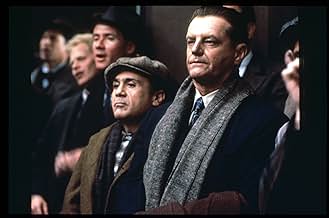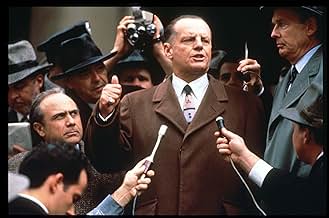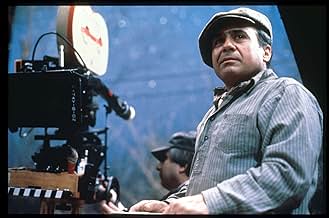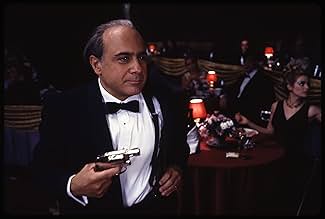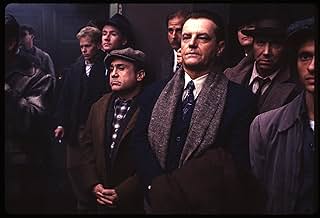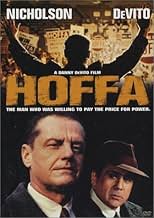Die Geschichte der berüchtigten amerikanischen Gewerkschaftsfigur Jimmy Hoffa, der einen erbitterten Streik organisiert und Geschäfte mit Mitgliedern des Syndikats für organisiertes Verbrech... Alles lesenDie Geschichte der berüchtigten amerikanischen Gewerkschaftsfigur Jimmy Hoffa, der einen erbitterten Streik organisiert und Geschäfte mit Mitgliedern des Syndikats für organisiertes Verbrechen macht, verschwindet 1975 auf mysteriöse Weise.Die Geschichte der berüchtigten amerikanischen Gewerkschaftsfigur Jimmy Hoffa, der einen erbitterten Streik organisiert und Geschäfte mit Mitgliedern des Syndikats für organisiertes Verbrechen macht, verschwindet 1975 auf mysteriöse Weise.
- Für 2 Oscars nominiert
- 2 Gewinne & 6 Nominierungen insgesamt
- Loading Foreman
- (as Joe V. Greco)
Empfohlene Bewertungen
Can I first say this was strange casting for Bobby Kennedy? It just seems like someone doing a very poor Kennedy impersonation, not a serious attempt to really capture him. Which is unfortunate, given how central his role is. (This film, more than anything, seems to be Hoffa versus Kennedy.) The Nicholson casting is not perfect, either, because it is hard to hide his distinctive voice... but I think he pulls it off ,and the makeup helps.
The Hoffa story is a fascinating one, and one that deserves to be explored on film again. This was 1992, and I write this in 2015. In the past two decades, more memoirs have been written, more government documents released... we need another biopic, and maybe a really serious documentary?
In the context of most commercial movies, which insist on explaining too much or repeating the obvious, Hoffa remains a reasonably detached consideration of the career of a man whose ties to the Mafia not only cost the rank-and-file teamsters millions but also set a pattern for corruption that tainted the entire labor movement. It's a quintessentially American story, for only here did Big Labor become a big business to rival Big Business.
DeVito and the Great Character Development Skeptic neither romanticizie him or try to explore Hoffa outside his own mechanical justification that you have to do it to others before they do it you. Without commentary, in very broad strokes, they authenticate Hoffa's advancement from minor reformer to big-time shark, power-dealer and mob friend.
The movie opens as the edgy, dog-tired Jimmy, convoyed by his committed odd-job guy, conjured character Bobby, waits in a Cadillac in a Detroit cafeteria lot for a rendezvous with an abiding Mafia accomplice. The reminiscences that are the bulk of the film aren't Jimmy's, but the indulgent, diligent Bobby's. He worries about Jimmy's state of affairs, remembering their first meeting in the Depressed 1930s when, one night on the road, Jimmy invited himself into his truck and tried to enlist him for the teamsters. Jimmy was then something of an optimist. As the hours drone on in the lot, Bobby sequentially recalls his way through Jimmy's career.
While Bobby's remembrance is tender, this captivating, hazy biopic sees all coolly. This gives this forgotten '90s drama an indignantly cynical tone that is generally uncommon in American movies. It compels us to decide for ourselves, something that can be infinitely puzzling as well as gratifying. The film proposes there are occasions when one must reason for oneself. It doesn't pose as a docudrama or anything close. It's a skillful work of fiction, rooted in fact, devised with ingenuity and a dependable viewpoint.
DeVito's direction is crammed with overstated kinesics that appear wholeheartedly consistent with Bobby's exceedingly highlighted reminiscences of life with Jimmy. There are numerous striking overhead shots, whether it's a scene of Jimmy incarcerated or a panoramic view of union men wrestling scabs. Simultaneously, DeVito knows when to use close-ups, that is, to divulge character instead of to intersperse dialogue. When the director shows a recalled explosion and fire, they have the massive scope of something recounted in an anecdote told late at night in a favorite dive.
It comes as a surprise, about midway through, to learn that the Teamsters head has a wife and daughter. They appear during a crowd scene. But this film about Jimmy Hoffa has no time to show him meeting his wife, dating her, marrying her, finding their dream house, having a kid. That's about as it should be.
Does the movie grant that Jimmy was an instrument of organized crime? Not by any means. Nor does it quite maintain that Hoffa would take any advantage he could get, anywhere he could, to systematize the drivers and press-gang the bosses. He was a union realist, but what makes this movie so beguiling is that we can never entirely peep the romanticism that should be in there somewhere, no glow of internal principle. Something murky must be driving him on a lonesome, ruthless revenge.
Nicholson is an actor who can echo virtually anything in his face. His intense, volcanic performance is so good as Hoffa because he betrays virtually nothing. When we first see him, the corporal embellishments are striking. He's filled with spite, not optimism. He organizes for the same reason other guys get in bar fights, because it discharges the intense stresses within.
The production is plentiful with period particulars, consecutively in an enduring procession. The truckers' world distinguishes with the world of control occupied by the insiders: The Old World sophistication of the Mafia sociables, for instance, or the rooms where dominant government men dwell. The movie makes its implicit case for union organizing simply by complementing the cabs and roadstops of the drivers with the world of opportunity.
This is an inspired and vibrant piece, but is that sufficient? It sharply divided critics, but for me it is. Others will have valid protests to the ways the film works. This genuinely absorbing piece reveals DeVito as a sincere filmmaker. He extracts the core guise and pitch for this material. Not every director would've been self-assured enough to purely show us Jimmy Hoffa rather than narrating all about him. This is a movie that finds its impact between the lines, in what is unstated.
Mamet's Hoffa knows the Kennedy family built their fortune out of rum running to a large extent, and he sees no difference between their corruption and his own compromises. At least, Hoffa tells himself, his own deals with the devil serve something larger then his immediate family, they serve the membership of the union. And this was very true, which is why a fair number of Teamsters still swear by the name Jimmy Hoffa. Nicholson's snide asides to his "betters" completely captures the class war basis that motivated the actual man's actions. Anyone who has been through an actual labor dispute and has been witness to the patronizing communications that come through a company eager to crush a union effort knows full well what fired up Jimmy Hoffa, even as we turn aside from the path he took.
The film succeeds because De Vito, Nicholson and Mamet understand what pushed the labor movement forward, and they understand its contradictions. Most important, they understand why those contradictions overwhelmed a man as gifted as Jimmy Hoffa, and this is what makes it better then your average Hollywood drama about labor. Hoffa is a film about working class attitude that gets beneath the usual dismissals of working class concerns, and as such, deserves respect. The powers that be have every legend about their leadership. It's time the working class was allowed legends about its own once again, provided we understand that they are legends, and therefore laden with much myth. The very real larger then life qualities of Jimmy Hoffa, however, make this a film worth more then one critical glance.
Unfortunately, the film is an inadequate showcase for Nicholson's talents. The story begins in 1975 on what presumably was the last day of Hoffa's life as he and his pal Bobby Ciaro (Danny DeVito) wait for some people to show up for a meeting at a Michigan roadhouse. They wait a long time which allows Bobby to recall many incidents in Hoffa's extraordinary career as a union organizer.
There are two problems with this. First Bobby, who's supposed to be something of an enforcer, is never credible. Although he's nearly always in view, he never seems to belong. Perhaps that's because he's entirely a creation of screenwriter David Mamet. Barely adequate as a story-telling device, Bobby's unfortunate insertion gives rise to the inevitable, more serious question: how much of this story is true?
If you accept Mamet's interpretation, Hoffa was a victim of a trusted associate, the Government, and the Mob, but foremost a hero because he fought for the working man. Fair enough. But when you watch "Hoffa" you don't really get a clear sense of why all this was so. Motivations are largely absent. The flashbacks pass by but you feel these are merely sketches or outlines, often presented without clear context. Some are believable, others seem to be mere speculation, still others, such as the scenes with Robert Prosky or the enormous riot sequence, implausible. Was Prosky's character real? Did so many people actually die? Ask Bobby, because in many ways it's as much his story as Hoffa's; but as we know, Bobby is pure fiction.
Mamet has been quoted as saying audiences look more for drama than for information. Fine, and who'd want to see Ken Burns' take on the Teamsters. But "Hoffa", for all its huffing and puffing, lacks the drama of Paul Schrader's "Blue Collar" or the better Mob pictures.
Recommended solely for Nicholson's performance.
Wusstest du schon
- WissenswertesThe only major make-up Jack Nicholson had to wear to become Jimmy Hoffa was fake nose and a set of false upper teeth (as seen in the behind-the-scenes footage on the DVD).
- PatzerWhen Jimmy and Billy torch bomb the building, they create a blast so intense, it blows out the passenger side window on Bobby's truck. Yet in the following shots, the window goes from being intact, to being shattered.
- Zitate
Jimmy Hoffa: If a guy's close to you, you can't slight 'im. You can't slight that guy. A real grievance can be resolved; differences can be resolved. But an imaginary hurt, a slight - that motherfucker gonna hate you 'til the day he dies.
- Crazy Creditsthere are no opening credits and the title of the film at the beginning.
- Alternative VersionenOn a special laserdisc edition, Danny DeVito hosts a supplemental portion of the disc with outtakes, including a scene where Hoffa perfectly shoots a beer bottle with a rifle.
- SoundtracksLet's Make Love Tonight
Written, Produced and Performed by Nicky Addeo
Top-Auswahl
- How long is Hoffa?Powered by Alexa
Details
Box Office
- Budget
- 35.000.000 $ (geschätzt)
- Bruttoertrag in den USA und Kanada
- 24.276.506 $
- Eröffnungswochenende in den USA und in Kanada
- 6.406.012 $
- 27. Dez. 1992
- Weltweiter Bruttoertrag
- 29.302.121 $
- Laufzeit2 Stunden 20 Minuten
- Farbe
- Seitenverhältnis
- 2.39 : 1
Zu dieser Seite beitragen




